[adrotate banner=”5″]
[metaslider id=282]
Getting to 10 Gbps using EoIP
The EoIP tunnel protocol is one of the more popular features we see deployed in MikroTik routers. It is useful anywhere a Layer 2 extension over a Layer 3 network is needed and can be done with very little effort / complexity. One of the questions that seems to come up on the forums frequently is how much traffic can an EoIP tunnel handle which is typically followed by questions about performance with IPSEC turned on. Answers given by MikroTik and others on forums.mikrotik.com typically fall into the 1 to 3 Gbps range with some hints that more is possible. We searched to see if anyone had done 10 Gbps over EoIP with or without IPSEC and came up empty handed. That prompted us to dive into the StubArea51 lab and set up a test network so we could get some hard data and definitive answers.
The EoIP protocol and recent enhancements
Ethernet over IP or EoIP is a protocol that started as an IETF draft somewhere around 2002 and MikroTik developed a proprietary implementation of it that has been in RouterOS for quite a while. Similar to EoMPLS or Cisco’s OTV, it faciltates the encapsulation of Layer 2 traffic over a Layer 3 network such as the Internet or even a private L3 WAN like an MPLS cloud. If you follow MikroTik and RouterOS updates closely, you might have come across a new feature that was released in version 6.30 of RouterOS.
What's new in 6.30 (2015-Jul-08 09:07): *) tunnels - eoip, eoipv6, gre,gre6, ipip, ipipv6, 6to4 tunnels have new property - ipsec-secret - for easy setup of ipsec encryption and authentication;
This is a much anticipated feature as it simplifies the deployment of secure tunnels immensely. It makes things so easy, that it really gives MikroTik a significant competitive advantage against Cisco and other vendors that have tunneling features in their routers and firewalls. When you look at the complexity involved in deploying a tunnel over ipsec in a Cisco router vs. a MikroTik router, there is a clear advantage to using MikroTik for tunneling. I originally looked into this feature for EoIP but it is available many other tunnel types like gre, ipip and 6to4.
When you look at the complexity involved in deploying a tunnel over ipsec in a Cisco router vs. a MikroTik router, there is a clear advantage to using MikroTik for tunneling.
Here is one of the simpler implementations of L2TPv3 over IPSEC in a Cisco router which still has a fair amount of complexity surrounding it.
http://www.cisco.com/c/en/us/support/docs/security/flexvpn/116207-configure-l2tpv3-00.html
VS.
http://wiki.mikrotik.com/wiki/Manual:Interface/EoIP
The MikroTik config has 3 required config items for EoIP on each router vs double the steps with Cisco and the added complexity of troubleshooting IPSEC if you get a line of config wrong.
The test network
In order to test 10 Gbps speed over EoIP, we needed a 10 Gbps capable test network and decided to use two CCR-10368G-2S+ as our endpoints and a CCR1072-1G-8S+ as the core WAN. We used an HP DL360-G6 with ESXi as the hypervisor to launch our test VMs for TCP throughput. We typically use VMs instead of MikroTik’s built in bandwidth tester because they can generate more traffic and have more granularity to stage specific test conditions (TCP window, RX/TX buffer, etc).
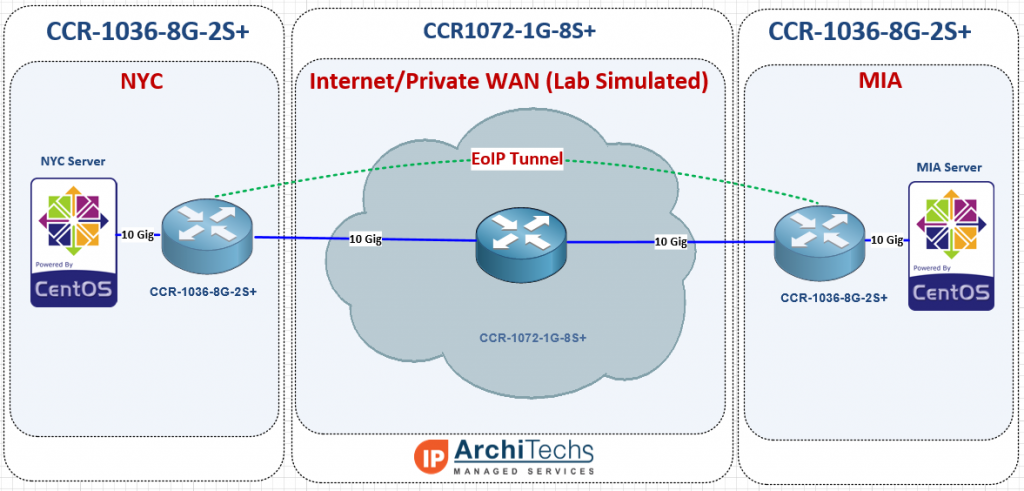
Concept of testing
Most often, EoIP is implemented over the Internet and so using 9000 as a test MTU might be surprising to some users and possibly irrelevant, but when using a private WAN, quite often a Layer 3 solution is much less expensive than Layer 2 handoffs (especially at 10 Gbps) and 9000 bytes is almost always supported on that kind of transport, so L2 over private L3 definitely has a place as a possible application for EoIP with 9000 byte frames.
9000 byte MTU unencrypted
9000 byte MTU encrypted with IPSEC
1500 byte MTU unencrypted
1500 byte MTU encrypted with IPSEC
And the results are in!!! 10 Gbps is possible over EoIP
10 Gbps over EoIP (Unencrypted with 9000 byte MTU)
Video of 10 Gbps over EoIP (Unencrypted with 9000 byte MTU)
7.5 Gbps over EoIP (IPSEC encrypted with 9000 byte MTU)
Video of 7.5 Gbps over EoIP (IPSEC encrypted with 9000 byte MTU)
6.4 Gbps over EoIP (Unencrypted with 1500 byte MTU)
Video of 6.4 Gbps over EoIP (Unencrypted with 1500 byte MTU)
1.7 Gbps over EoIP (IPSEC encrypted with 1500 byte MTU)
Video of 1.7 Gbps over EoIP (IPSEC encrypted with 1500 byte MTU)
Video will be posted soon.
Use cases and conclusions
The CCR1036 certainly had no issues getting to 10 Gbps with the right MTU and test hardware, but we were suprised that the IPSEC thoughput was so high. Considering a pair of CCR1036-8G-2S+ routers are just a little over $2000.00 USD, 7.5 Gigabits of encrypted throughput with IPSEC is incredible. Even over a 1500 byte MTU, the 1.7 Gbps we were able to hit is amazing considering it would probably take at least 20k to 30k USD to reach that kind of encrypted throughput with equipment from a mainstream network vendor like Cisco or Juniper.
Use cases for this are probably too numerous to mention but we came up with a few
- Extending an ISP or joining two or more ISPs in different regions
- High volume PPPoE backhaul to a BRAS
- Data Center Interconnect (DCI) at Layer 2
- Enterprise HQ and Branch connectivity or backup
- Layer 2 network extension for network migration or merger.
Please feel free to leave comments with questions about the testing or use cases we might not have thought of…we love getting feedback 🙂
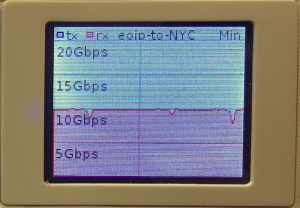
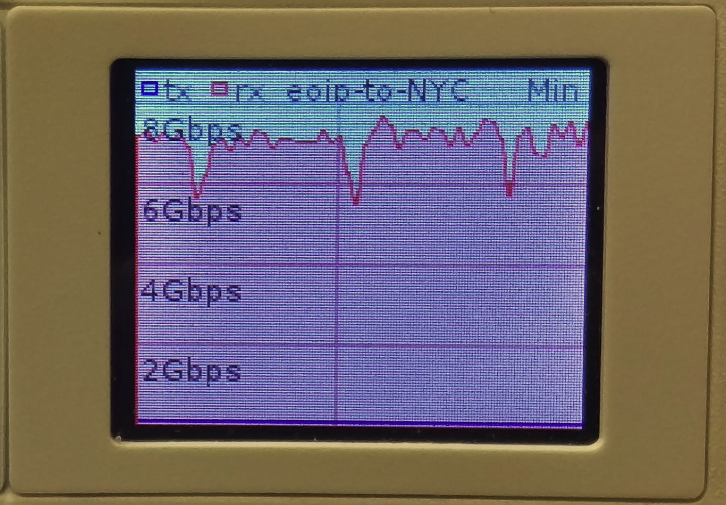
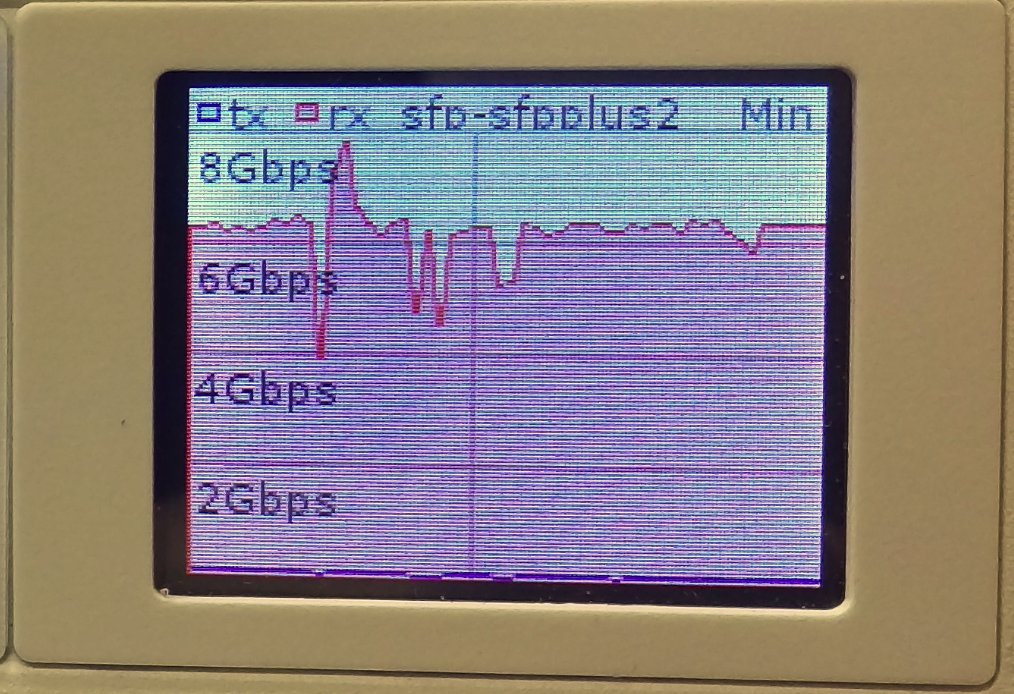
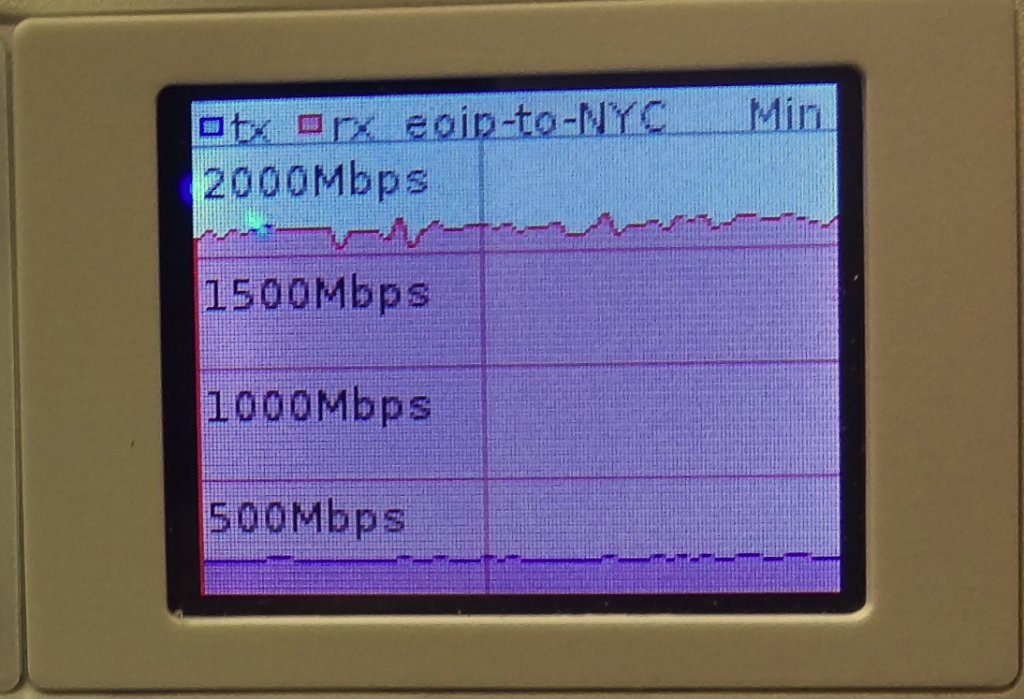
I’d like to see the same test using RouterOS 6.33 🙂
*) fastpath – eoip,gre,ipip tunnels support fastpath (new per tunnel setting “allow-fast-path”);
Awesome tests, thnx for doing them and sharing! 😀
Thanks! And you’re welcome. Glad the info was useful for you. 🙂
nice review bro… 🙂
many thank for sharing this awesome review…
Thank you for your review!
Lyma
Thanks for this!
Did anyone ever perform RFC benchmarking for layer-2 using JDSU testsets or similar, through Mikrotik’s EoIP?
We’re using RB2011il-rm’s, and are getting bit errors and LOF and out-of-sync’s.
SD
MikroTik does RFC testing and publishes the numbers on their website….this was intended to be more of a real world performance test.
Hello
We did a similar test using 3 x CCR-1036-12G-4S but were unable to obtain high throughput with IPSEC. All our links were set at 1Gig because of the limitation of our end devices. With interfaces capped at 1Gig, configured with EOIP only we got 650Mbps. Once we issued the IPSec-secret command for the EOIP interface, that traffic dropped to 38Mbps. Did you have to do change anything besides MTU? IPSec parameters?
thank you
force ipsec to use aes encryption, because it has a hardware acceleration on ccr devices
Thank you for posting the MT’s updates.
Can you share your configuration with us please? We use the MT’s to L2 connect our remote sites across ISPs but the best we’re able to get is 38Mbps with EoIP+IPsec. We’re hoping your config can shed some light as to why we’re not able to achieve the performance numbers you’re able to accomplish.
Casey
Unfortunately, I don’t have the config from that test anymore, but considering the devices were directly connected in a lab, you might want to use two test devices and directly connect them with your current config and see if the speeds improve. If they do, then you know there might be an issue with your provider.
Hello, friends! I’ve a problem with encription. I have CCR1009s directly connected both. My speed test gave result: 980Mbit/s for simple routing from eth1 on 1st router to eth1 on second router. My test’s platform: iperf, speedtest by ookla (eth1 on 2nd router is Uplink). But I use tunnels between routers, I have a worse result: sstp – 40Mbit/s, IPSec tunnel – 100Mbit/s, L2TP/IPSec – 15Mbit. But CPU is loaded about 2 percent, so that is not CPU overload problem. We want to buy about 150 devices, but I want to encript about 2Gbit/s summary.
Thankx for your help!
What kind of traffic were you passing over the link? It sounds like you were pulling a Normis and sending UDP instead of TCP.
While it is true that these devices can be used to do this throughput, it is a very ugly flow that doesn’t actually work in a real application. With hardware accelerated IPSec on these CCRs, packets are encrypted on a per packet basis. Effectively making this per packet load balancing across the cores. This creates out of order flows which has the real world impact of making connections behave erratically, TCP hates this and would be a disaster for a UDP flow. Until this is fixed, it would be crazy to use hardware accelerated IPSec in the real world unless you used it for a specially tuned application/host endpoints that could handle this well.
It would be nice if the article was updated to mention this since your tests show up in searches and it seems people are having issues reproducing this outside of a lab setting.
http://forum.mikrotik.com/viewtopic.php?f=1&t=112545
Any tips for obtaining reasonable performance when the WAN side requires fragmentation AND is the actual internet? I’ve attempted a similar setup with a Microtik VM on each side, since I wanted to test before considering a hardware purchase, and am seeing pretty poor throughput before even adding encryption to the mix. So at this point from VM to VM running latest RouterOS 7.4, EoIP+bridge on both sides of normal non-tagged interfaces, I am seeing at best about 260 Mbit/sec of TCP throughput, but 4+ Gbps of UDP. The tests are via iperf on normal 1500 byte MTU VLANs which of course must be fragmented to make it across the internet. The endpoints are on networks that have a minimum of 20 Gbps to the internet, no appreciable packet loss, about 50ms of latency. Same test with Ubuntu 20LTS with native linux bridging, vxlan tunneling, vm’s on the same two hosts/networks, and tuning the send/receive buffers and tcp window, I can get into the 600 Mbit range, which is of course still really poor, but still more than double RouterOS. The same two VM’s themselves doing iperf end to end can achieve 8-9Gbps UDP and typically 7 Gbps TCP if using two streams, or ~4 Gbps for single streams. These are all on top of ESXi 7 with vmxnet3 and the relevant hardware offload features enabled.
Would actual hardware be expected to handle the packet fragmenting better, ideally at least a few gbps before adding encryption?